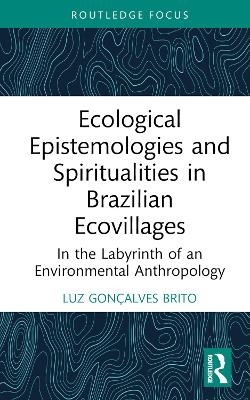
Ecological Epistemologies and Spiritualities in Brazilian Ecovillages
In the Labyrinth of an Environmental Anthropology
Seiten
2023
Routledge (Verlag)
978-1-032-45820-5 (ISBN)
Routledge (Verlag)
978-1-032-45820-5 (ISBN)
This book brings together ethnographic field research on four permacultural ecovillages in Brazil to highlight the importance of spirituality and ecological epistemologies as key analytical tools. For researchers in phenomenology, environmental philosophy, environmental anthropology, religious studies.
This book brings together ethnographic field research on four permacultural ecovillages in Brazil to highlight the importance of spirituality and ecological epistemologies as key analytical tools. It demonstrates that ecological spirituality can, and should, be understood beyond the dichotomy of personal and political, between people and nature, in the field of environmental anthropology.
The book uses a broad philosophical methodology based on the phenomenological theories of Maurice Merleau-Ponty, Tim Ingold and Alfred Schutz combined with post-structuralist conceptions of the relationship between person and world, individual and society. The field research consisted of ethnographic travel, observation and recorded dialogue with individuals based in each ecovillage: Arca Verde, situated in Campos de Cima da Serra; Vrinda Bhumi, a Vaishnava ecovillage in Baependi-MG; Goura Vrindavana, a Vaishnava ecovillage in Paraty-RJ; and Muriqui Assu Ecovillage Project, a secular ecovillage in Niterói-RJ. Throughout the book ethnographic research is woven together with poetic interludes, images, personal narrative experience and phenomenological theory, bringing a new understanding and approach to environmental anthropology as a discipline.
Including a Preface written by Tim Ingold, it will appeal to academics, researchers and upper-level students in phenomenology, environmental philosophy, environmental anthropology, religious studies and social sciences more broadly.
This book brings together ethnographic field research on four permacultural ecovillages in Brazil to highlight the importance of spirituality and ecological epistemologies as key analytical tools. It demonstrates that ecological spirituality can, and should, be understood beyond the dichotomy of personal and political, between people and nature, in the field of environmental anthropology.
The book uses a broad philosophical methodology based on the phenomenological theories of Maurice Merleau-Ponty, Tim Ingold and Alfred Schutz combined with post-structuralist conceptions of the relationship between person and world, individual and society. The field research consisted of ethnographic travel, observation and recorded dialogue with individuals based in each ecovillage: Arca Verde, situated in Campos de Cima da Serra; Vrinda Bhumi, a Vaishnava ecovillage in Baependi-MG; Goura Vrindavana, a Vaishnava ecovillage in Paraty-RJ; and Muriqui Assu Ecovillage Project, a secular ecovillage in Niterói-RJ. Throughout the book ethnographic research is woven together with poetic interludes, images, personal narrative experience and phenomenological theory, bringing a new understanding and approach to environmental anthropology as a discipline.
Including a Preface written by Tim Ingold, it will appeal to academics, researchers and upper-level students in phenomenology, environmental philosophy, environmental anthropology, religious studies and social sciences more broadly.
Luz Gonçalves Brito holds a PhD in Social Anthropology from the University Federal do Rio Grande do Sul/UFRGS, Brazil. She is committed to environmental humanities, phenomenology and intersectionality. Her current research interests include political ecology, gender, race and mental health.
Foreword by Tim Ingold Prelude 1. Exploring a fractal labyrinth Interregno: on ontological insecurity in Porto Alegre caused by the fossil fuels crisis, which resembled an Armageddon 2. The way of the Muriqui-Assu Interlude: sociality of the chickens 3. Gaudya Vaishnavismo in Serra da Bocaina (Rio de Janeiro) 4. Gaudya Vaishnavismo in Serra da Mantiqueira (Baependi-MG) Denouement: breaking through the social membrane
| Erscheinungsdatum | 20.04.2023 |
|---|---|
| Reihe/Serie | Routledge Environmental Anthropology |
| Zusatzinfo | 1 Tables, black and white; 19 Halftones, black and white; 19 Illustrations, black and white |
| Verlagsort | London |
| Sprache | englisch |
| Maße | 138 x 216 mm |
| Gewicht | 417 g |
| Themenwelt | Sozialwissenschaften ► Ethnologie |
| Sozialwissenschaften ► Soziologie ► Spezielle Soziologien | |
| Technik ► Umwelttechnik / Biotechnologie | |
| ISBN-10 | 1-032-45820-8 / 1032458208 |
| ISBN-13 | 978-1-032-45820-5 / 9781032458205 |
| Zustand | Neuware |
| Haben Sie eine Frage zum Produkt? |
Mehr entdecken
aus dem Bereich
aus dem Bereich
eine Einführung
Buch | Softcover (2024)
De Gruyter Oldenbourg (Verlag)
29,95 €


